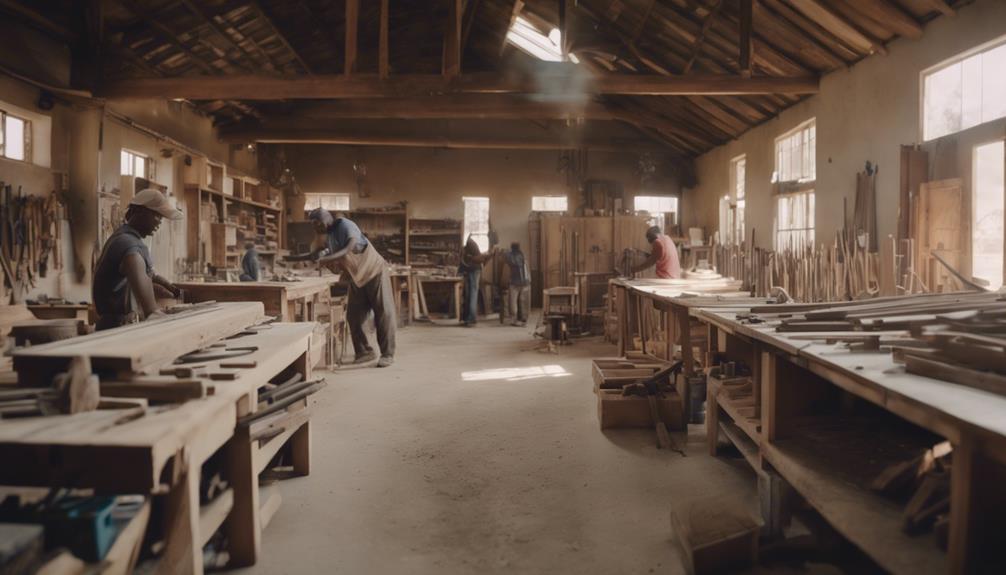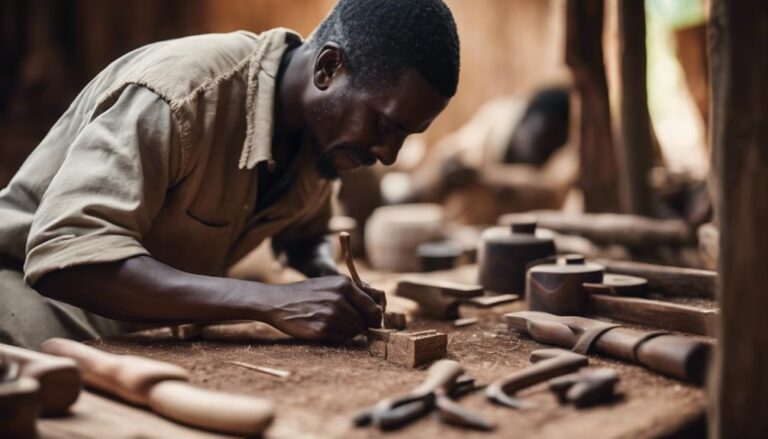Within the realm of British wood joinery, a multitude of challenges persist, subtly shaping the industry's landscape. Issues like wood shrinkage due to moisture loss and the complexities arising from sourcing wood from different countries like Mozambique and Congo merely scratch the surface of the hurdles faced.
Factors such as wood quality, skills shortages, and economic pressures intricately intertwine, presenting a maze of obstacles for those in the wood joinery sector.
As we delve deeper, the intricate interplay between tradition, innovation, and sustainability in British wood joinery offers a rich tapestry of insights waiting to be uncovered.
Key Takeaways
What challenges does the South African wood joinery industry face? From wood shrinkage to poor processing standards and a shortage of skilled joiners, various obstacles hinder its growth. Factors like wood quality, competition from imports, sustainability concerns, and economic issues further complicate the industry's success. Overcoming these hurdles is crucial for the sector to flourish. Contact Holzfleck for assistance and explore our range of Wooden Products tailored to your needs. Request a quote today to elevate your space with our high-quality products.
Impact of Wood Quality on Joinery
Impact of Wood Quality on Joinery
Understanding the significance of wood quality in South African wood joinery is paramount for ensuring the structural integrity and longevity of joinery connections. High-quality wood with balanced moisture content is essential for stable and precise wood joinery work. Wood prone to warping, twisting, or splitting can compromise the integrity of joinery connections, highlighting the critical role of wood quality in this craft.
Moisture content variations in wood can lead to joint failures and structural issues, underscoring the importance of using properly dried and acclimatized wood sourced from reliable suppliers. Moreover, comprehending specific wood species' characteristics and shrinkage properties is crucial for successful wood joinery projects in South Africa. By selecting the right wood quality, joiners can mitigate the risk of potential issues such as joint failures and ensure the long-term durability and strength of their joinery applications, emphasizing the foundational role that wood quality plays in the realm of South African wood joinery.
Availability of Skilled Joiners
Availability of Skilled Joiners
The shortage of proficient joiners in South Africa poses a significant challenge within the wood joinery industry, impacting the quality and timeliness of projects in the sector. The scarcity of skilled joiners can be attributed to the lack of proper training programmes and apprenticeships available to individuals interested in pursuing a career in joinery. Skilled joiners are vital for ensuring the precision and craftsmanship required in furniture and construction projects. However, the demand for skilled joiners far exceeds the current workforce, resulting in delays and quality issues in wood joinery projects across the country. Addressing this shortage is crucial for the growth and sustainability of the wood joinery sector in South Africa.
To overcome this challenge, it is essential for the industry to invest in training programmes that equip individuals with the necessary skills to become proficient joiners. By nurturing a new generation of skilled joiners, the industry can enhance its capacity to deliver high-quality joinery work and meet the demands of the market effectively.
Competition From Imported Wood Products
The influx of imported wood products presents a formidable challenge to the competitive landscape faced by South African wood joinery businesses. Imported wood products often directly compete with locally produced wood joinery in South Africa, impacting market share and pricing dynamics within the industry. This competition not only puts pressure on the pricing strategies of South African wood joinery businesses but also challenges the quality standards and craftsmanship for which they are known.
Moreover, the price competitiveness of imported wood products can necessitate local businesses to innovate and differentiate themselves to maintain their market relevance. South African wood joinery enterprises may find it challenging to stand out against the wide variety and options available from imported wood products, requiring them to focus on unique selling points, exceptional quality, and superior customer service to retain their customer base in the face of this competition.
Adapting to the challenges posed by imported wood products is essential for the sustainability and growth of South African wood joinery businesses in today's market environment.
Sustainability Concerns in Wood Sourcing
Sourcing wood sustainably in South Africa involves a strategic focus on reducing deforestation and promoting responsible forestry practices, aligning with certification programmes such as the Forest Stewardship Council (FSC). These sustainable practices aim to minimise environmental impact and ensure the long-term health and biodiversity of forests. In wood joinery, sustainable sourcing is crucial to meet the growing demand for environmentally conscious products. Popular choices include reclaimed wood and recycled timber, which not only reduce the need for new raw materials but also add unique character to projects. Local initiatives further emphasise the use of indigenous wood species and support for community-based sourcing, enhancing the socio-economic impact of the wood industry.
| Sustainable Wood Sourcing | Benefits |
|---|---|
| Reducing deforestation | Preserves forest ecosystems |
| FSC Certification | Ensures ethical wood sourcing |
| Reclaimed wood usage | Adds character to projects |
Economic Factors Affecting Wood Joinery
Economic Factors Affecting Wood Joinery
Economic stability plays a pivotal role in shaping the landscape of wood joinery in South Africa, with factors such as fluctuating exchange rates significantly impacting import costs for raw materials and the pricing of finished wood products. The wood joinery industry is highly sensitive to changes in exchange rates as it directly affects the cost of importing essential raw materials like timber and hardware. Fluctuations in exchange rates can lead to unpredictable production costs, making it challenging for wood joinery businesses to maintain consistent pricing for their products and services. Moreover, inflation rates play a crucial role in determining the final prices of wood products, influencing consumer demand and overall market dynamics.
In a country where economic growth is often uncertain, wood joinery businesses face challenges in forecasting demand and planning production schedules. The job market conditions also impact the availability of skilled labour in the wood joinery sector, with wage fluctuations affecting production expenses. Additionally, changes in interest rates can influence borrowing costs for businesses looking to invest in equipment and expand their operations, further adding to the economic challenges faced by the wood joinery industry in South Africa.
Conclusion
In the end, the South African wood joinery industry faces tough challenges like wood shrinkage caused by losing moisture, poor processing standards from imported wood, and a shortage of skilled joiners. The quality of wood, competition from imports, concerns about sustainability in sourcing wood, and economic factors make things even harder for the sector. It's essential to tackle these hurdles to ensure the wood joinery industry in South Africa can thrive.
If you need assistance, don't hesitate to get in touch with Holzfleck. Explore our site and shop for Wooden Products that suit your needs.
Don't miss out on the opportunity to improve your space with our products. Request a quote from us today and take the first step towards enhancing your environment.




